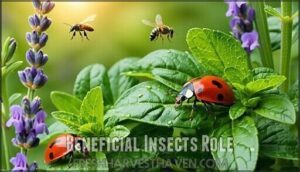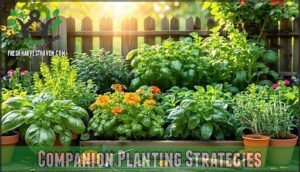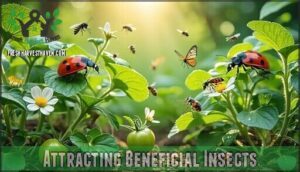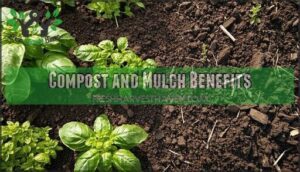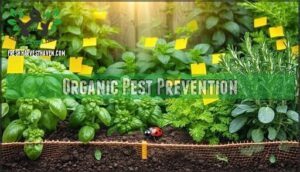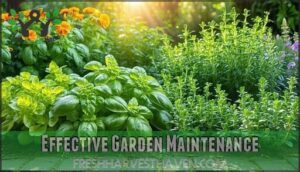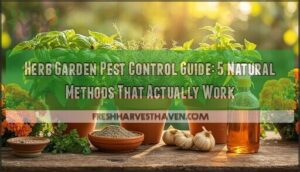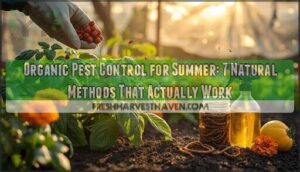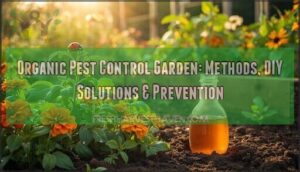This site is supported by our readers. We may earn a commission, at no cost to you, if you purchase through links.
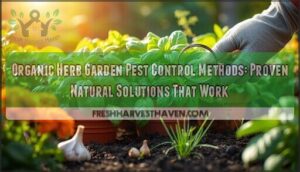
Let ladybugs patrol and munch pests, and pair basil with tomatoes to deter bugs. Simply adding marigolds, chives, or garlic keeps troublemakers away, while healthy soil packed with compost builds tougher, pest-resistant herbs.
Got a magnifying glass? Early garden inspections catch problems before they spread.
Physical barriers and less spraying keep friendly insects around. Remember, keeping your garden naturally pest-free is both an art and a science—stick around and discover clever tricks that put you ahead in the garden game.
Table Of Contents
- Key Takeaways
- Natural Pest Control Methods
- Healthy Soil Practices
- Organic Pest Prevention
- Integrated Pest Management
- Effective Garden Maintenance
- Frequently Asked Questions (FAQs)
- How do you control pests in an organic garden?
- Are herbs good for pest control?
- Is organic gardening a good choice for pest control?
- How do herbs repel pests?
- What do organic farmers use for pest control?
- How to keep pests out of herb garden?
- What can I spray on my herbs to keep bugs away?
- What is the best organic pest control?
- How do I keep bugs off my herb garden?
- How do you control insects in an organic garden?
- Conclusion
Key Takeaways
- Attract beneficial insects like ladybugs and lacewings—they’re your best natural defense against pests.
- Use companion planting with herbs like basil, mint, and chives to keep bugs away and boost garden health.
- Maintain healthy soil with compost and mulch to grow resilient herbs that naturally resist pests.
- Skip harsh chemicals by checking your plants regularly, handpicking bugs, and using natural sprays like neem oil or garlic solution.
Natural Pest Control Methods
You can manage herb garden pests with natural solutions that keep your plants healthy without resorting to chemicals.
With methods like handpicking, using neem oil spray, and encouraging beneficial insects, you’ll stop most common invaders before they do real damage.
Beneficial Insects Role
Attracting Predators like ladybugs, lacewings, hoverflies, and parasitic wasps is your secret weapon for organic pest control.
Nature’s army—ladybugs, lacewings, and wasps—work overtime to keep your herb garden balanced and pest-free
These beneficial insects keep your herb garden in check, creating Natural Balance while boosting Ecosystem Health. As the garden’s “bouncers,” they curb pests and protect fragile herbs—no chemicals needed.
For effective, science-backed Pest Control, count on these front-line heroes:
- Ladybugs devour up to 5,000 aphids
- Lacewing larvae demolish spider mites
- Parasitic wasps target caterpillars
- Hoverflies eliminate aphid colonies
Companion Planting Strategies
Companion planting gives your herb garden some serious backup in terms of organic pest control. Pair basil with tomatoes to fend off aphids, while marigolds keep nematodes underground.
Mint’s strong aroma deters ants and furry intruders, just plant it in pots to control its wild side. Garlic drives beetles and aphids away, working double duty beside most herbs.
Chives pull their weight by repelling carrot flies and supporting soil health. This approach helps with repelling specific pests and also maximizes space and encourages better flavor and growth support, leading to a healthier, more resilient garden.
This is due in part to how it facilitates efficient use of space, which is a key factor in creating a healthier garden with better flavor and growth support.
Attracting Beneficial Insects
If you want your organic herb garden to act like its own natural pest control squad, it’s all about giving beneficial insects what they need.
Just as companion planting helps, building diverse habitats turns your garden into a self-sustaining ecosystem. Consider the habits of ladybugs, lacewings, and parasitic wasps—they stick around where food, water, and shelter are easy to find.
You can support their appetite for pests by focusing on:
- Nectar-rich flowers like yarrow and dill for attracting beneficial insects
- Water source—place a shallow dish within three feet of pest-prone herbs
- Shelter creation with coarse mulch for ground beetles
- Reducing pesticides, especially near flowers, to protect your organic pest control allies
Providing these basics keeps your herb garden healthy and resilient. You can find various seed options online for this purpose.
Healthy Soil Practices
Healthy soil gives your herbs nutrients and supports natural pest resistance, saving you from constant pest battles.
Rich, living soil is your garden’s frontline defense—healthy herbs thrive while pests are left behind
When you use compost and mulch, you’ll improve soil structure, moisture, and beneficial microbe activity for a stronger, healthier garden.
Organic Matter Importance
When you boost organic matter in your herb garden, you’re laying the groundwork for resilient plants and smart, sustainable pest control.
Think of organic matter as the fuel for good soil health—it builds a robust foundation by promoting natural defenses.
Here’s how it strengthens your soil:
- Improves soil structure for better water retention, so roots thrive.
- Promotes steady root growth, letting herbs develop pest-fighting compounds.
- Increases nutrient availability, powering vigorous, healthy plants.
- Fuels microbial activity, creating a lively ecosystem that discourages many pests.
Healthy soil means you’re always one step ahead, with resilient plants.
Compost and Mulch Benefits
Healthy soil practices start with quality compost and mulch—the unsung heroes in your organic herb garden.
Compost transforms plain dirt into a powerhouse of good soil health by packing in nutrients and introducing beneficial microbes, making your herbs tougher against pests.
Mulch plays backup, holding moisture like a sponge so you water less and your herbs aren’t left parched.
It blocks weeds before they get a toehold and keeps soil temperatures steady through sunny heatwaves and chilly nights—a true safety net for your roots.
Think of them as your garden’s security detail, quietly working day and night.
Here’s a quick breakdown: They also help with improving soil texture.
| Benefit | Compost | Mulch |
|---|---|---|
| Soil Enrichment | Boosts nutrients, microbes | Feeds soil as it breaks down |
| Water Retention | Improves soil structure | Reduces evaporation big time |
| Weed Suppression | No direct effect | Shades out weed seeds |
| Temperature Regulation | Minimal | Insulates roots year-round |
Organic Pest Prevention
Stopping pests before they settle in your herb garden takes a smart mix of science-backed prevention methods.
You’ll use tactics like crop rotation, barriers, and natural sprays to create a strong first line of defense against common invaders, utilizing a combination of methods for effective pest control, including natural sprays.
Crop Rotation Techniques
Ever wondered why your parsley struggles in the same spot year after year? Practicing crop rotation is key for organic pest control in your herb garden.
By shifting herb families—think mint, basil, oregano—to new locations each season, you break the pest cycle and see real pest reduction. Family rotation also bolsters soil health, letting different plants replenish used nutrients naturally.
The big rotation benefits? Fewer pests and healthier herbs, all without chemicals. Stick to rotation for nutrient management and organic methods that keep your garden thriving.
To enhance these benefits, consider grouping crops by family for a more strategic approach.
Physical Barriers and Traps
After rotating your herbs, you’ll want backup that keeps pests at bay before they can start trouble.
Physical barriers step in here, placing a literal wall between your plants and the hungry invaders. Relying on organic pest control keeps things safe for both your garden and the helpful insects you want to stick around.
Try these proven tactics to keep your herb garden safe:
- Mesh netting lets sunlight and air through but keeps out larger pests. Think of it as a bug screen for your basil.
- Copper tape around pots or beds gives slugs and snails a mild zap—no chemical showdown needed.
- Sticky traps and row covers target flying insects like whiteflies and aphids while letting in light and rain.
- Slug traps lure slugs away, keeping your leaves hole-free.
Barrier methods offer low-tech, reliable protection, helping your herbs thrive. For various sizes, consider a mesh netting garden to suit your needs.
Natural Sprays and Repellents
Protection comes in many forms, but regarding your herb garden, natural sprays are your best defense.
Neem oil uses range from breaking pest life cycles to reducing infestations when sprayed every couple of weeks. A DIY Garlic Spray does wonders against aphids and caterpillars—just blend, strain, and spritz.
Soap spray efficacy is high, suffocating soft-bodied bugs; stick to 1-2% mild soap for safety. Chili pepper spray works as a pepper repellent recipe, frustrating beetles and mites.
Botanical oil mixes, especially peppermint and rosemary, confuse pests’ senses. One effective solution involves using diatomaceous earth around plant bases to combat crawling pests.
These natural insecticides let you stay chemical-free while keeping your herbs thriving.
Integrated Pest Management
Integrated pest management helps you keep herb pests in check using targeted, science-based steps.
You’ll identify problems early and apply just the right mix of natural controls to protect your plants without harming the ecosystem, which is a key part of integrated pest management.
Regular Garden Inspections
Swapping chemical sprays for vigilance pays off in a thriving organic herb garden. Consistent, weekly checks are the backbone of any herb garden pest control guide.
Early Detection keeps your basil safe and mint lively, while smart Pest Identification sidesteps confusion between hungry caterpillars and friendly ladybugs. Use a magnifying glass if needed—the tiniest critters often spell the biggest trouble.
Record Keeping is your secret weapon for tracking outbreaks and Inspection Frequency turns into habit.
Here’s what to watch for:
- Document pest lifecycles and outbreaks.
- Assess damage severity before acting.
- Practice identifying both pests and diseases. This process involves careful Record Keeping to ensure effective management of your herb garden.
Biological Controls and Barriers
As you check your herbs, get ready to put biological controls to work.
Predator introduction—like ladybugs or lacewings—keeps aphids in check, while parasitic wasps quietly battle beetles and caterpillars.
Don’t overlook physical barriers; row covers and diatomaceous earth shield basil and mint from hungry pests.
Birdhouses benefit your pest patrol, attracting bug-eating friends.
Mix in nematode control below ground and companion planting up top for an effective—and chemical-free—herb defense system.
You can also leverage companion planting strategies to naturally deter pests.
Effective Garden Maintenance
You’ll keep your herb garden thriving by choosing pest-resistant varieties, building healthy soil, and skipping chemical shortcuts.
Stick with regular care, and you’ll prevent most pest problems before they start.
Planting Pest Resistant Varieties
After tackling integrated pest management, let’s talk smart variety selection. Planting pest-resistant herbs can save you headaches—and your harvest.
Some varieties, like ‘Rutgers Obsession DMR’ basil or ‘Nufar’ basil, come loaded with natural defenses that laugh in the face of common problems like downy mildew and Fusarium wilt. Choose seeds adapted to your local climate or opt for native plants—nature’s built-in pest control.
- Pick herb varieties bred specifically for pest resistance.
- Source seeds or starts that thrive in your region.
- Use companion planting and pest-repelling herbs to strengthen your lineup.
Herb resistance starts in the seed packet.
Maintaining Soil Health
After picking pest-resistant herb varieties, your next power move is building strong soil – it’s like setting up a neighborhood watch for your plants.
Great soil composition and plenty of microbial life help herbs naturally fend off pests.
Want to maintain soil health? Here’s your organic solutions checklist for long-term pest control:
- Test soil pH yearly and adjust with gentle amendments.
- Add compost monthly for steady nutrient balance.
- Use organic mulch to boost water retention and Erosion Control.
- Mix in diverse plant matter for enrichment.
- Encourage microbial life with regular organic gardening practices.
To further improve soil, consider balancing soil pH for ideal growth.
Avoiding Chemical Treatments
Caring for soil health naturally leads you to question what’s really growing alongside your herbs.
Instead of reaching for harsh sprays, try safe alternatives that protect both your garden and your plate. Many gardeners find non-toxic options like neem oil or garlic sprays—natural solutions that pack a punch against pests but don’t leave unwanted residues.
Homemade remedies and eco-friendly control methods, such as companion planting or hand-weeding, bring you the freedom to use organic solutions while keeping your harvest safe.
Here’s how common choices stack up:
| Chemical Treatment | Natural Alternative |
|---|---|
| Synthetic insecticides | Neem oil spray |
| Chemical fungicides | Baking soda solution |
| Systemic pesticides | Beneficial insect release |
| Herbicides | Hand weeding/mulching |
| Soil fumigants | Crop rotation methods |
Frequently Asked Questions (FAQs)
How do you control pests in an organic garden?
Ever wonder if one rotten apple spoils the bunch?
In your garden, early pest control does just that—prevents outbreaks.
You’ll want to rely on handpicking, beneficial insects, neem oil sprays, and regular plant inspections for best results to achieve complete control.
Are herbs good for pest control?
You’ll find herbs like basil, mint, and chives double as garden bouncers, sending pests packing with their strong scents.
Planting these guys near veggies gives bugs second thoughts—and buys you some peace of mind.
Is organic gardening a good choice for pest control?
Synthetic sprays may offer a quick fix, but organic gardening gives you long-term freedom.
When you choose organic, you encourage natural pest control, healthier soil, and safer herbs—so you’re truly winning the pest war, minus the chemicals.
How do herbs repel pests?
Herbs like basil, mint, and garlic release aromatic oils that confuse, repel, or mask the scent trails pests use to find plants.
It’s like posting “no vacancy” signs for unwanted bugs in your garden.
What do organic farmers use for pest control?
Picture pests sneaking into your garden like uninvited guests at a picnic.
You counter with neem oil, garlic spray, diatomaceous earth, handpicking, crop rotation, and ladybugs—natural shields keeping your plants safe, strong, and chemical-free.
How to keep pests out of herb garden?
Start by spacing plants for airflow, checking weekly for damage, and plucking pests by hand.
Sprinkle diatomaceous earth around stems, invite ladybugs with dill or fennel, then rotate crops yearly.
No need for harsh sprays!
What can I spray on my herbs to keep bugs away?
It’s funny how bugs show up just when herbs look best.
You can spray a homemade mix of water with mild soap, neem oil, or garlic extract—each repels pests while keeping your herbs safe for the kitchen.
What is the best organic pest control?
For easiest results, try neem oil or insecticidal soap—you’ll knock out bugs without risking your dinner plans.
Add a sprinkle of diatomaceous earth, and you’ll scare off crawling pests faster than a rabbit in a thunderstorm.
How do I keep bugs off my herb garden?
Keep bugs away by planting friends like marigolds and garlic, inspecting leaves for early signs, and spraying homemade garlic or soap solutions.
Mulch with diatomaceous earth, bring in ladybugs, and skip constant watering so damp soil doesn’t invite trouble.
How do you control insects in an organic garden?
You’ll win the bug battle by encouraging helpful insects, rotating crops, and using organic sprays like neem oil.
Inspect your plants often, handpick pests, and keep things tidy—think of it as housekeeping, but with dirt under your nails.
Conclusion
Think of your herb garden as a fortress—organic herb garden pest control methods are your best defense.
By using healthy soil, barrier strategies, and helpful bugs, you’ll protect basil and friends the smart, chemical-free way.
Stay alert with regular garden checks, and pests won’t stand a chance, so remember that small efforts add up.
Follow these methods, and your herbs will thrive naturally, giving you a bounty of flavors without worry, keeping your garden’s defenses strong and simple.
- https://rootsandrefuge.com/organic-garden-pest-control/
- https://ecoterrabeds.com/blogs/eco-terras-healthy-sleep-blog/organic-pest-control-for-your-garden?srsltid=AfmBOoqB3OFlgbLJ6W5RexmFw1hWyQr-EBGleai5jyWHnthE9dwrnDfy
- https://www.azurefarmlife.com/farm-blog/herbs-and-flowers-for-organic-pest-control-in-the-garden
- https://www.farmstandapp.com/20141/using-herbs-for-natural-pest-control-in-gardens/
- https://www.motherearthnews.com/organic-gardening/organic-pest-control-zm0z11zsto/

